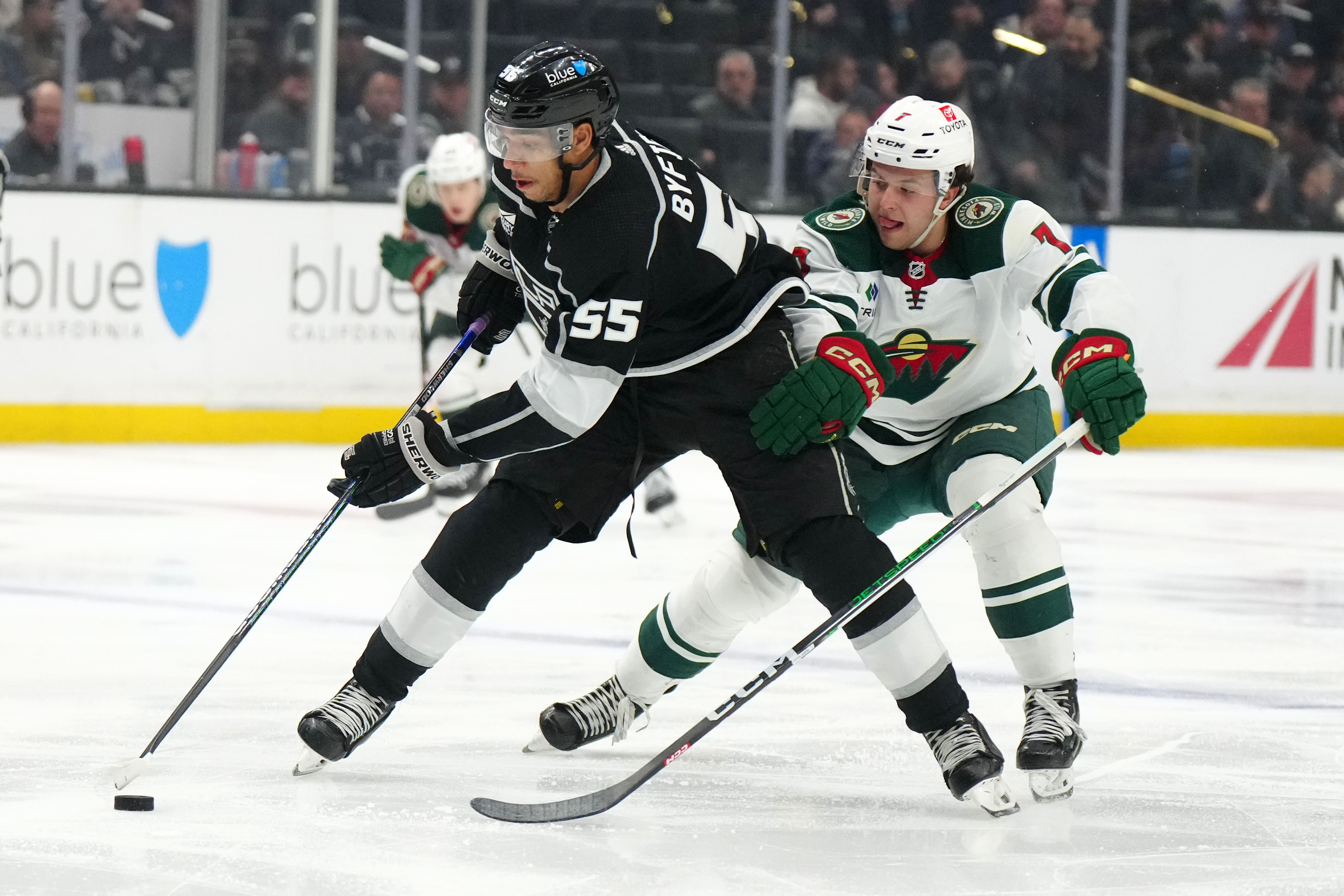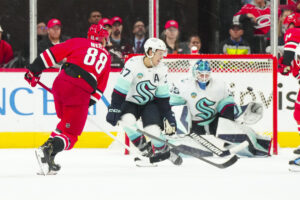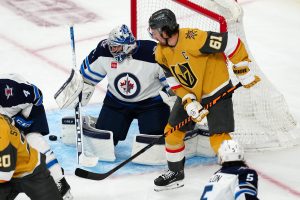The Minnesota Wild have a young defenceman in Brock Faber. He is coming off a strong rookie season which saw him finish second in Calder Trophy voting. The next step is putting pen to paper and working on a contract extension.
Brock Faber Contract Extension Talks
Many parts of the Minnesota Wild’s 2023-24 season will be considered forgettable. The team didn’t make the playoffs and their cap situation continues to make roster moves difficult. That being said, one thing that the Wild faithful can hang their hat on is the emergence of Brock Faber. Faber, a defenceman from Minnesota, played his first full NHL season and immediately stepped in as an impact player. Additionally, Faber led the Wild defence corps in scoring and has already made himself a star in the state of hockey after the Wild acquired him in 2022. After a resounding success of a season, talks for a Brock Faber contract extension are already under way.
Discussions about a possible Brock Faber contract extension began in March of 2024 when the Athletic’s Michael Russo and Shayna Goldman reported that Wild GM Bill Guerin was planning on extending Brock Faber during the offseason and also was “anticipating paying him on par with other young defenceman who have gotten monster second contracts over the past few years.” While giving Faber a contract extension may feel premature, a big money extension fits with prevailing wisdom in today’s NHL. Many teams choose to lock in their young stars early and sign them to extensions before their rookie contract concludes. Faber projects to be a crucial part of Minnesota’s future, and Guerin will be best-served following the trend and locking the defender down now.
The “Bet” Contract
Before discussing a possible Brock Faber contract extension, first we must examine the trend of giving out big extensions before a player’s entry-level contract is over. Over the past several years, the “bet” contract has come into vogue at a rapid pace. The “bet” comes from teams signing promising young talent to big money, long-term contracts very early into their careers. Teams don’t yet know whether the players will be worth the money, but an early commitment can save money.
There are several examples of this in recent years as players like Jake Sanderson, Owen Power and, most recently, Juraj Slafkovsky inked notable extensions before the last year of their rookie contracts began. With this being a recent trend, the success rate of deals like this remains to be seen, but they appear to be paying early dividends. In the modern NHL, players are productive earlier into their careers. This contract model allows teams to commit money to their most important players at their most productive age. The Wild should employ this strategy when it comes to a Brock Faber contract extension. In fact, they’ve already shown willingness to sign deals like this already.
Wild Show Willingness to Sign Players Early
As mentioned, The Minnesota Wild are already showing a willingness to sign contracts with young/inexperienced players under their current regime. So far, it’s difficult to argue the contracts haven’t been home runs. The first comparable contract that comes to mind is the extension Minnesota signed with Kirill Kaprizov. Kaprizov, like Faber is this offseason was coming off a fantastic rookie season. The Russian forward won the Calder Memorial Trophy, nearly unanimously, after notching 51 points in 55 games for Minnesota. Bill Guerin rewarded these efforts with a five-year contract worth $9,000,000 annually. Since that signing, Kaprizov has continued to be Minnesota’s most consistent points producer. Kaprizov isn’t a perfect parallel for Faber, however. Kaprizov may have only proved himself in the NHL for one season, but he also played important minutes in the KHL.
A more apt comparison would be the contract of Matt Boldy. Boldy is a foundational young player for the Wild and signed his contract extension before completing his entry-level deal. Boldy has lived up to his seven-year $49,000,000 deal so far, as his contract is rated as one of the most valuable in the league. According to the Athletic’s Dom Luszczyszyn, Boldy’s contract ranks as the tenth most valuable in the NHL based on a model that compares production on his actual contract versus what that production is worth. Both Boldy and Kaprizov’s value show that it is viable and even important to lock young players up, even when they’re relatively inexperienced.
Brock Faber Contract Extension Outlook
Now that a precedent has been established for a signing of this nature, both around the NHL and for the Wild specifically, a Brock Faber contract extension can be examined. When landing on terms for a contract extension there are a few important factors to consider. Two of the most important are the contexts of the player to the team (how crucial they are to the team’s lineup, future, etc.) and comparable contracts signed in recent years.
Context
Where does Brock Faber fit in with the Minnesota Wild? It’s pretty clear he’s a crucial part of the team. Faber will turn 22 next season, so he should only get better, but even where he’s currently at, he’s still the Wild’s most important defensive piece. Faber plays the most minutes, scores the most points, and is trusted in the highest leverage situations. When examining Faber’s role on the team, and how that plays into contract negotiations, it’s pretty simple. No one should be making more money on the Minnesota Wild defence than Brock Faber.
The Wild’s current highest-paid defender is Jared Spurgeon. Spurgeon is the team’s captain and has played an important role for them for years. That being said, the Alberta native is also 34-years-0ld and is starting to experience injury trouble. It’s safe to assume Faber’s deal will outpace Spurgeon’s, whose current deal gives him a cap hit of $7,575,000. That being said, the Wild’s cap situation isn’t the only one that will matter for a Brock Faber contract extension, as it is also important to compare similar contracts around the NHL.
Comparables
When considering a comparable contract, there are a few criteria that are important to consider. A contract extension considered comparable to a hypothetical Faber extension should have a few things in common. The player’s age, NHL experience, and relative position on the team. For Faber, this means finding young defenceman who signed contracts before playing 100 NHL games, but are also considered to be among their team’s most important pieces. When considering this criteria, two recently signed contracts stand out.
The first name that functions as a clear comparable is the aforementioned Jake Sanderson. Sanderson signed his extension, worth $8,050,000 annually for eight years, with Ottawa after only playing 77 games with the franchise. In his rookie year, he finished sixth in Calder voting and registered 32 points. Sanderson checks all the boxes, but there are a few factors that make his situation different. Sanderson signed in Ottawa, a team that has traditionally had a hard time attracting free agents and keeping their own talent. One could make the argument his contract is a little rich because of this. That being said, Faber produced better results in his rookie season than Sanderson. These contracts are probably comparable.
Owen Power is another name that jumps out as comparable to Faber. Like Sanderson, he signed his extension with Buffalo after a strong rookie season. More than the results, Power also carries high expectations due to being a number one overall pick. The Buffalo Sabres product signed his eight-year $8,350,000 extension after his rookie year. Power’s contract, though comparable, may provide some pause for the Wild. Power arguably played worse in his sophomore season than his rookie year, but he’s young and promising. There’s still plenty of time to turn the ship around.
Final Thoughts on Brock Faber Contract Extension
In conclusion, The NHL is now much more willing to bet on young players than in years past. This trend has led to several teams locking up key pieces on long-term deals where they save some money due to the contracts being a bit of a bet. The Wild are already experiencing success with this strategy with Matt Boldy and Kirill Kaprizov. It is absolutely imperative for the Wild to sign a similar extension with Brock Faber. Faber is a key part of the team, and they already lack cap space, making it crucial to save money wherever they can.
But what does a contract for Faber look like? Given the context of his importance to the team, and comparable contracts signed recently, Faber should be the Wild’s highest paid defender and should sign a contract that takes up a similar percentage of the cap that Jake Sanderson and Owen Power did when they signed their extensions. Sanderson’s previously mentioned contract ate up 9.6% of the cap, while Power’s occupied 10%. With the cap rising to $88M, the Wild should expect to pay roughly $8,500,000 – $9,000,000 for eight years on a Brock Faber contract extension. This may seem like a lot for a player who just completed their rookie season. Still, that’s the way the league works now, and most teams have seen positive results. If the Wild want to lock down Faber and for a good price, they should do so now.
Main Photo: Kirby Lee-USA TODAY Sports






